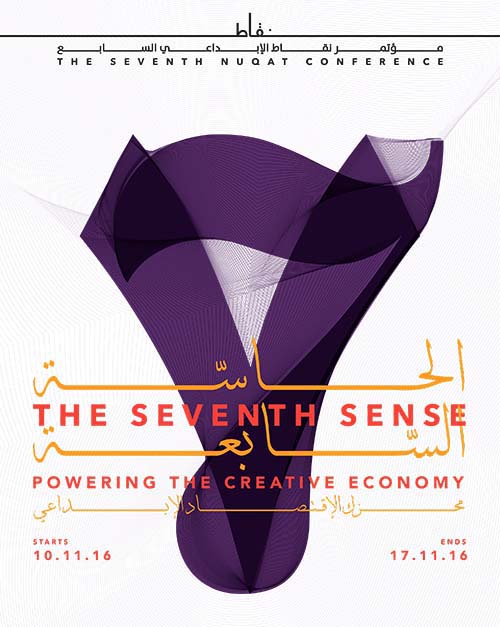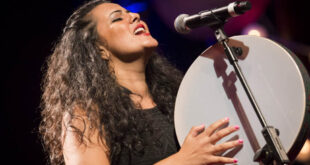Issue 23, winter/spring 2017
https://doi.org/10.70090/MAF177SP
This year’s three-day conference entitled “The Seventh Sense: Powering the Creative Economy,” delved into the capacity of the brain to come up with new ideas through discussions on finding alternatives to oil-driven economies.
“We want to create awareness about creativity, interactive learning, and interdisciplinary learning,” said co-founder Hussa Al Humaidhi. Creativity is the art of thinking that requires acceptance of one’s self, of reality, of different thoughts, of ideas, of religions, and of others, she added.
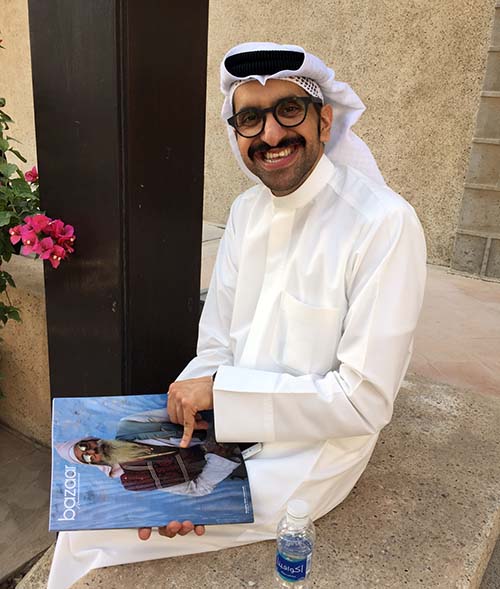
“That requires critical thinking, and ultimately self-criticism,” she said. “Sadly education today isn’t up to snuff, it’s still reactive. We must have critical thinking in education. We must have passion.”
Except for uneven local attention, the Nuqat conference in November 2016 was not on the regional or international media’s radar. The blend of art, culture, creativity, innovation, social media, and business knowhow marking the event went nearly unnoticed by journalists from the broader Arab world who seemed more consumed by politics, disasters, mayhem, and mudslinging.
But promoting culture is one of the most important things Arabs can do in light of destruction of, and the war on, culture launched by extremist and terrorist groups in the region, said Sultan Al Qassemi, founder of the Barjeel Art Foundation.
And it is not limited to elites, he insisted. “Every single member of our community in the Arab world has a responsibility and has the ability today, thanks to mobile phones, to document and save culture in case it disappears.”
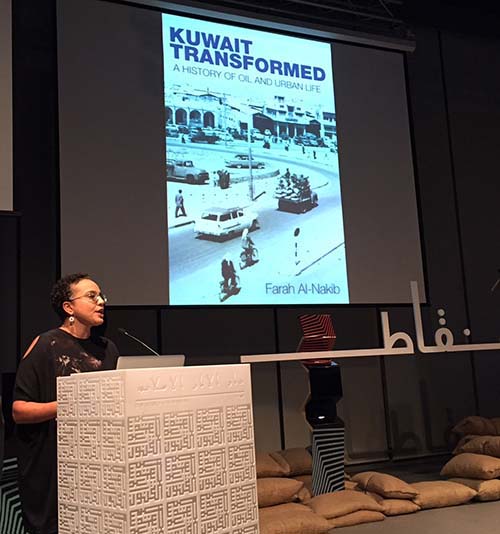
Al Qassemi, a patron of the arts, is from the United Arab Emirate of Sharjah where he set up his foundation. He wants to preserve everything from lullabies, poetry, and music to paintings and sculptures.
He spoke at the Nuqat conference about the Arab world’s rich history in culture, and promoted the notion of cultural diplomacy, but admitted that funding in general remained a hindrance to supporting the arts.
The hyperkinetic Al Qassemi rattled off a list of exhibitions Barjeel is promoting from the end of 2016 through 2017, including a show on lettering in Egypt’s coastal city of Alexandria, as well as contemporary and modern art exhibitions in Jordan, Paris, and Washington, D.C.
Historian/educator Farah Al-Nakib shared a critical approach to Kuwait’s evolution, saying the modernization scheme was no longer sustainable.
Al-Nakib, an assistant professor of history and director of the Center for Gulf Studies at the American University of Kuwait, advocated a return to the city by restoring and sustaining creativity, and allowing for diversity and engagement.
“Modernist planning led to urbanization, more cars, and less focus on pedestrian spaces,” she said, adding that oil wealth had affected the arts and culture, and had led to a decline in those disciplines.
Zahed Sultan added a touch of avant-garde electronic music between lectures, panels and presentations. Other cultural activities included a poetry night, an exhibition and two evening musical performances.
From further afield and in a slightly different vein, engineer Majdi Ghorbel spoke on how he founded Vakay, a trailblazing Tunisian eyewear company. His creative juices led to the production of premium brand wooden sunglasses—available internationally—in his own workshop in Tunisia with the help of designers and an accountant but no business plan at the outset.
“A good team is better than a good idea,” he said of his operation inspired by Tunisia’s arts and heritage. “We had to build an ecosystem since no machines were readily available (to manufacture the frames).”
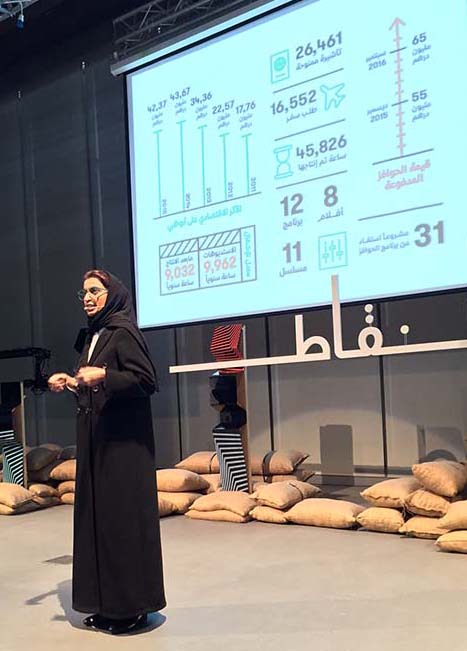
On another note, a heated panel discussion on copyrighting and censorship was aptly titled “Does passion need a license?” Censorship in many Arab countries bans references to sex, religion, and politics. Real literature, authors claim, is what disrupts.
Sofana Dahlan, a gutsy Saudi Arabian lawyer and activist who is not cowed by her country’s strictures, founded the accelerator and creativity incubator Tashkeil Global Company.
She said the problem was not with censorship per se, but rather with how it is implemented. Her start on the path to creativity began while handling entertainment cases and related contracts and it’s been a rough road involving rejection, misogyny, and harassment. But that hasn’t deterred her from pursing her passion, albeit within her country’s conservative traditions, and while trying to push those boundaries.
“We must have financial literacy to avoid conflict on fine print (in contracts),” she said and called for the education of censors, pointing to the use of dated laws, sometimes from as far back as the 1970s. “We must create awareness.”
Bothayna Al-Essa, a controversial Kuwaiti author and founder of Takween Project for Creative Writing, complained the government treated creative people as minors and slapped them with excessive censorship.
“How do we monitor the monitors?” she pondered.
In another session, Kuwaiti author Saud Alsanousi decried a government ban on his novel Mama Hessa’s Mice, about the era of the Iraqi invasion of Kuwait in 1990 on charges it stirred up sectarian tensions.
“I was stunned by the censorship and for which I got no official explanation,” he said. Ironically, the book is sold in other Arab countries.
Abdallah Absi, CEO and founder of Beirut-based crowdfunding platform Zoomaal, said his endeavor was made possible through social media. Crowdfunding enables innovation and Zoomaal aims to fill the financing gap for early stage innovation in the Arab world and emerging markets, Absi said, citing Lebanese band Mashrou Leila as a successful case study.
“The future of crowdfunding is very promising,” he said, but cautioned that a major problem was sustainability.
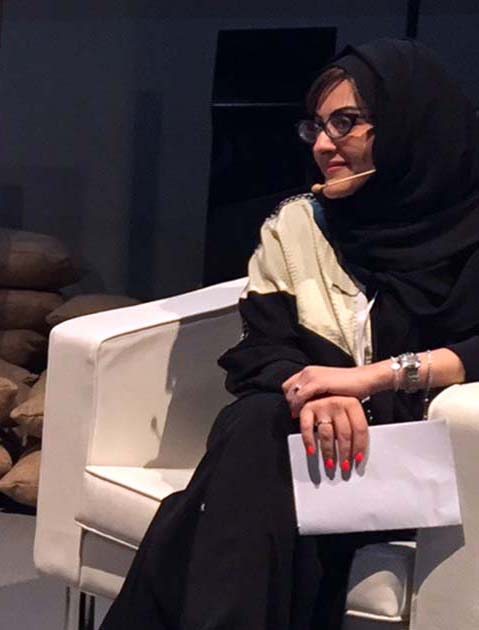
Loay Malahmeh, co-founder of 3D MENA, a for-profit hardware incubator and social innovation hub based in Amman, Jordan, explained how his firm creates cost effective prosthetics to help refugees and others in need.
Noura Al Kaabi, CEO of Abu Dhabi-based media free zone twofour54 and the UAE’s minister of state for Federal National Council Affairs, is a leader who was named one of the 20 most powerful women in global television by the Hollywood Reporter in 2016.
“Any creative region begins with people,” she explained. “At twofour54 we have an innovation lab. The key element is to engage with youth.”
The conference was followed by four days of intensive workshops including designing and producing Arabic fonts using the Glyphs app, know one’s customer to improve one’s business, food in motion videography, tapestry design inspired by Sadu (a tradition of embroidery practiced by Bedouins in the Gulf), boosting one’s employability in the creative industry, and creative problem solving skills in leadership.
I attended the first two workshops featuring Lebanese graphic design, typography, calligraphy, and lettering artist Tarek Atrissi, and Syrian entrepreneurship, design thinking, and business management trainer Yara Al-Adib.
“I’m interested in how typography becomes part of the visual language,” Atrissi said, adding that one can create compositions and visuals without resorting to pictures. Atrissi, who was a graphic designer working with fonts, said the Arab brand was becoming cool again and that common factors in the Arab world are the language and change, with the complexity of culture in every aspect of design.
For Yara Al-Adib, designers must know their customers to improve their business. Unfortunately, many designers focus more on the creative side of their projects and neglect business requirements that keep them financially viable. Communicating about, and marketing, designers’ brands is almost an afterthought to many artists and creative people.
“You have to be relevant digitally, but customer service should not be digital,” Al-Adib said of the need for the human touch.
The Nuqat conference is an enriching experience that will go on the road to Arab countries for two years before returning to Kuwait, organizers said. Nuqat is a non-profit organization dedicated to the development of creativity in the Arab world. First known as “Nuqat ‘ala al-Huruf” (dots on letters), it has hosted a yearly conference since 2009 that includes workshops, exhibitions, entertainment, children’s activities, and design competitions.
 Arab Media & Society The Arab Media Hub
Arab Media & Society The Arab Media Hub
